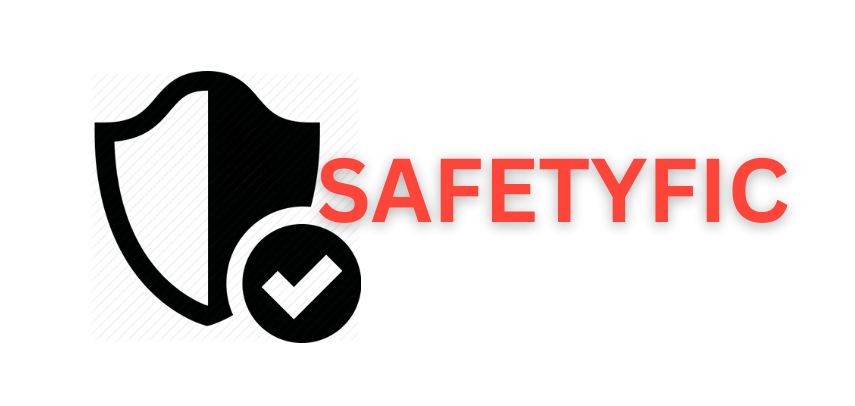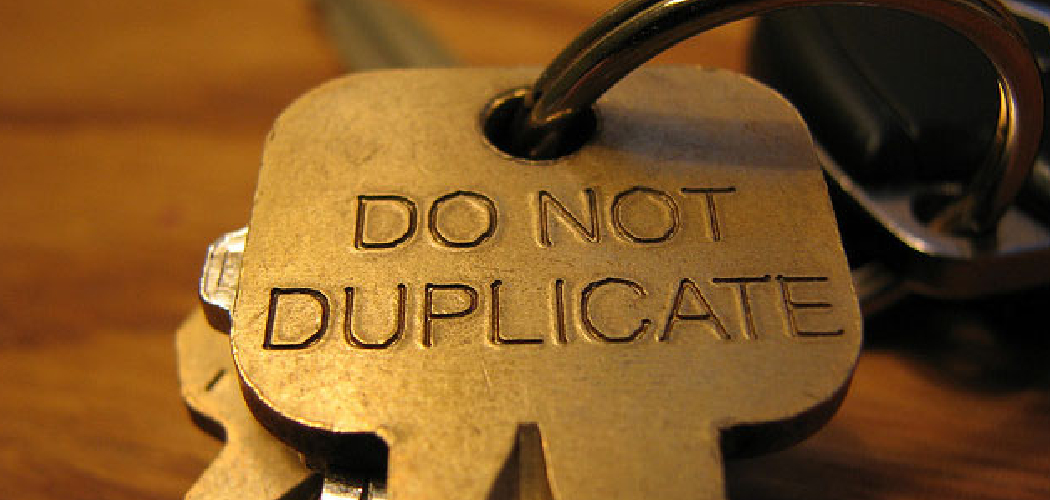A “Do Not Duplicate” (DND) key is a special type often used in commercial and residential buildings to enhance security measures. These keys are typically stamped with a warning that indicates they should not be copied without proper authorization. The intent behind this designation is to restrict unauthorized access and mitigate potential security breaches.
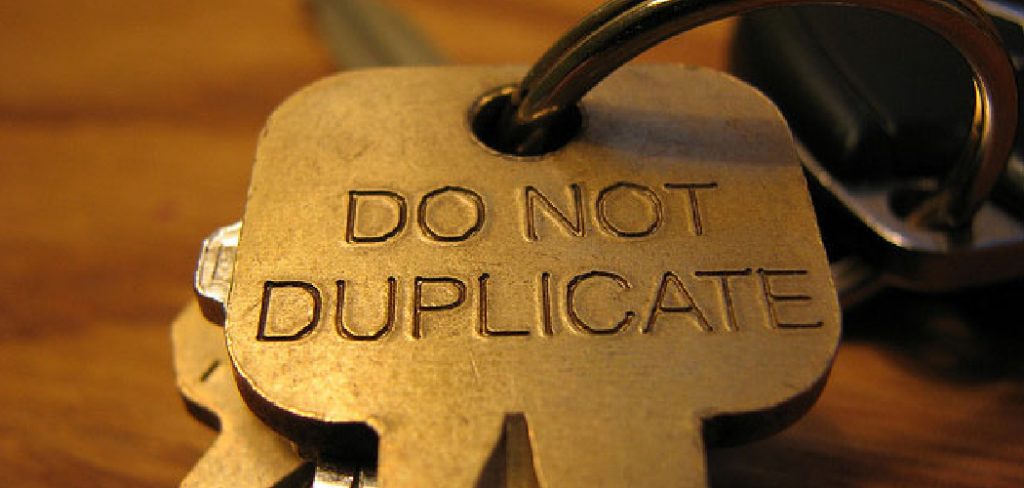
However, the warning on a DND key is not a foolproof legal barrier against duplication. In practice, whether a key can be copied depends on the local laws and the policies of locksmiths and hardware stores. Therefore, it’s crucial to understand the legality and ethical implications before attempting to duplicate a DND key. For individuals seeking guidance on how to get a do not duplicate key made, it’s imperative to navigate these considerations carefully and seek out authorized services that respect these restrictions.
Understanding “Do Not Duplicate” Keys
What is a DND Key?
A “Do Not Duplicate” (DND) key is designed explicitly to control who can obtain copies, acting as a security measure. The marking “Do Not Duplicate” is usually inscribed by the locksmith or the company that issued the key to discourage unauthorized copying. This label serves as a reminder and a reference to the intended limitations on key reproduction, although it does not inherently possess legally enforceable power.
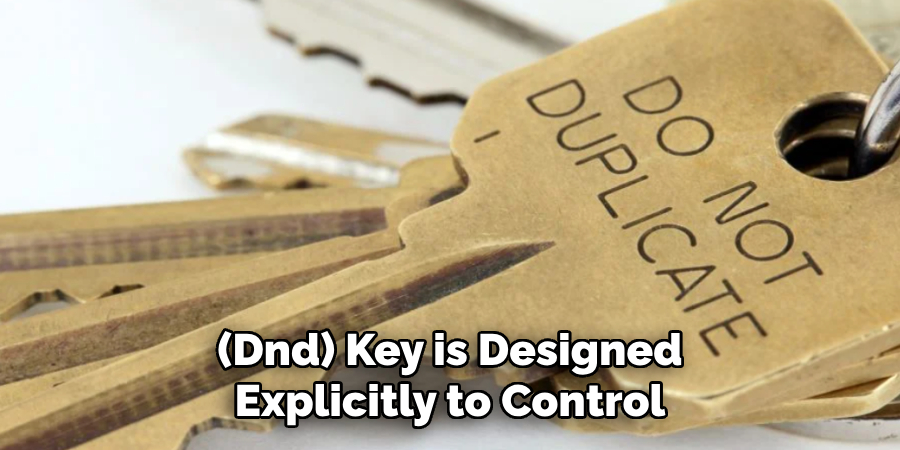
Why Are These Keys Used in High-Security Settings?
DND keys are commonly employed in high-security environments such as businesses, apartment complexes, or government buildings. Their primary purpose is to enhance security by limiting the possibility of unauthorized individuals gaining access.
In these settings, maintaining control over who can enter certain areas is crucial for protecting sensitive information, valuable assets, or the safety of occupants. Using DND keys gives property managers and business owners an additional layer of security, helping prevent unauthorized duplication that might compromise their space.
Why Some Locksmiths and Stores Won’t Duplicate DND Keys
Many locksmiths and hardware stores adhere to the DND warning for ethical and liability reasons. By respecting the “Do Not Duplicate” label, they help uphold security measures and avoid potential repercussions of unauthorized key duplication. Locksmiths often honor their agreements with the original keyholders, such as building owners or property managers, and refrain from making copies for unauthorized individuals. This practice ensures the integrity of the security systems in place and maintains trust with their clients.
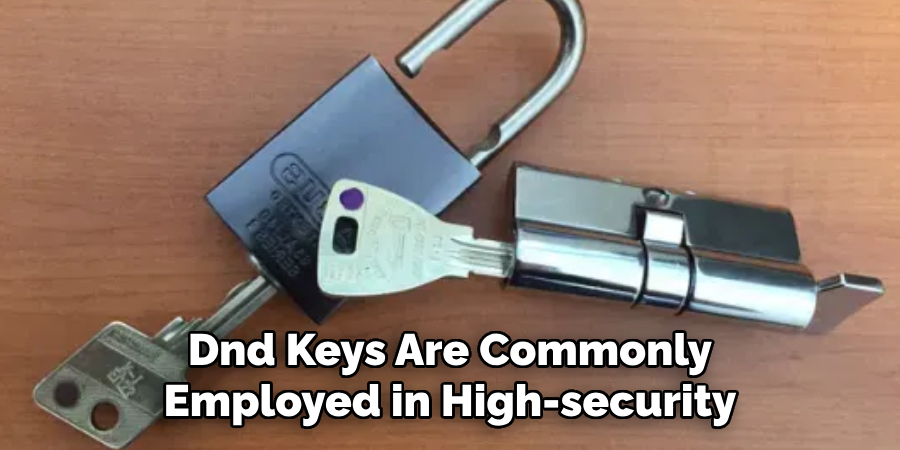
Legal and Ethical Considerations
It’s important to note that the DND marking is generally a request rather than a legally binding order. However, duplicating a DND key without explicit permission can violate lease agreements, employment policies, or specific security protocols established by property or building management.
Such violations could lead to serious consequences, including increased liability for security breaches. Therefore, before attempting to duplicate a DND key, it is vital to review the policies of your property or building management. Where permission is required, seeking authorized services and adhering to the established procedures is crucial for maintaining security and fulfilling your responsibilities as a keyholder.
Getting Permission to Duplicate a DND Key
Obtain Written Authorization from the Keyholder
The first step in obtaining a duplicate for a “Do Not Duplicate” key is to secure written permission from the appropriate keyholder, such as a landlord, employer, or property manager. This process involves formally requesting authorization, often facilitated through direct communication or a formal letter. The written document indicates that you have been granted the right to reproduce the key, and possessing it significantly increases the likelihood that a locksmith or hardware store will agree to make a duplicate. Here is a simple guide on how to draft a letter of authorization:
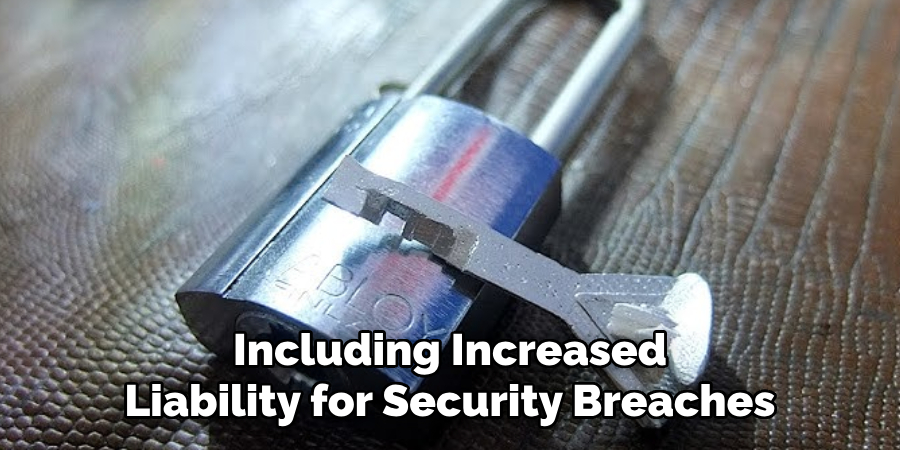
- Begin with a formal greeting addressing the locksmith or hardware store.
- Clearly state your request to duplicate a specific DND key.
- Include essential details such as the key code and the building address.
- Explain your role (e.g., tenant, employee) and why the duplication is necessary.
- Obtain a signature from the rightful keyholder confirming their approval.
- Conclude with gratitude for their assistance and provide your contact information for any follow-up.
Providing Proof of Ownership or Lease Agreement
Providing proof of ownership or a lease agreement can further substantiate your request when seeking to duplicate a DND key. Such documentation demonstrates your legitimate connection to the property and affirms your rights to request a key copy. Presenting this evidence in conjunction with the written authorization reduces any reluctance the locksmith or hardware store might have regarding the duplication’s legality. Clear communication with the locksmith is paramount; proactively explaining that you possess all necessary permissions ensures smooth collaboration and reinforces your credibility.
Emphasizing your compliance with legal permissions reassures the service provider and aligns with ethical standards in key duplication. Ultimately, following these procedures facilitates the duplication process and upholds the integrity and security mutually desired by all parties involved.
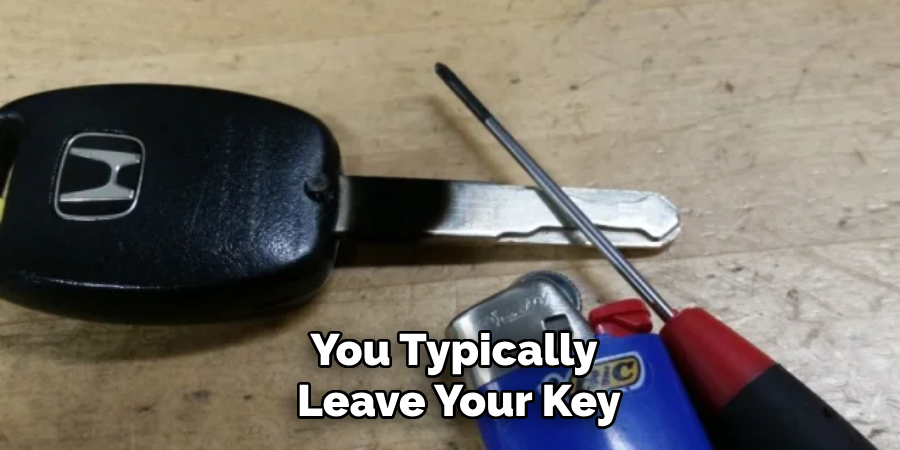
How to Get a Do Not Duplicate Key Made: Finding a Locksmith Who Will Duplicate a DND Key
Researching Locksmiths or Hardware Stores That Offer Duplication Services
When searching for a locksmith or hardware store willing to duplicate a “Do Not Duplicate” key, especially with proper authorization, it’s crucial to adopt a methodical approach. Start by compiling a list of local establishments known for key duplication services. Smaller, independent locksmiths tend to exhibit more flexibility in duplicating DND keys compared to larger chains like Home Depot or Lowe’s, which typically adhere to strict corporate policies prohibiting such duplication due to liability concerns.
Contact these locksmiths directly and inquire about their DND key duplication policies. Clearly explain your situation, referencing your authorization and any associated documents, to facilitate an open and informed discussion about your needs.
Locksmith Associations and Professional Locksmiths
Ensuring that the locksmith you choose is a member of a professional association, such as the Associated Locksmiths of America (ALOA), provides an added layer of trust and assurance regarding the service’s ethical standards. Membership in such organizations often indicates adherence to stringent ethical guidelines and practices, ensuring that any key duplication process aligns with the legal and ethical frameworks governing restricted keys.
Professional locksmiths are more adept at handling sensitive key duplication, maintaining both security and integrity in their operations.
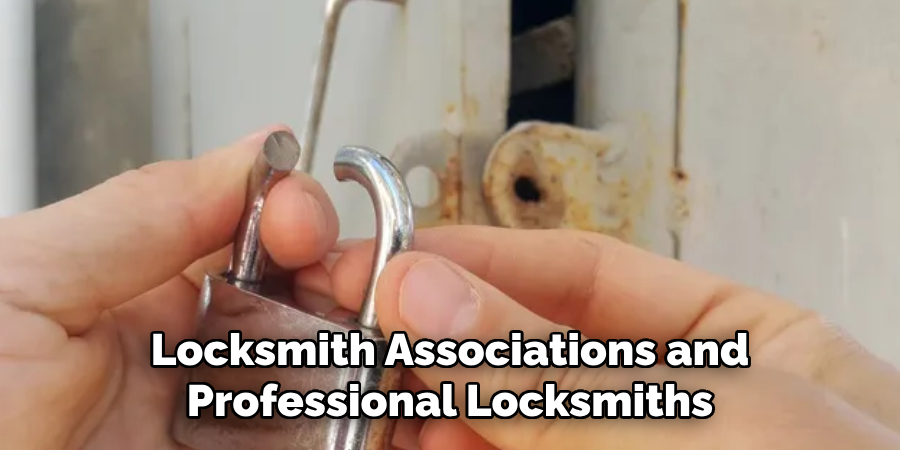
Online Services for Duplicating Keys
In addition to local options, some online services offer key duplication, including the possibility of duplicate DND keys. These platforms usually require a clear, high-quality photo of the key along with proof of authorization to proceed with duplication. While convenient, it’s essential to approach online key duplication services with caution. Verify the reputation and security measures of the service before providing any sensitive information.
Reading reviews, checking the service’s credentials, and ensuring they operate securely can help mitigate risks associated with sending a photo of your key. By employing these careful considerations, you can successfully navigate the path to legally and ethically duplicating a “Do Not Duplicate” key.
Exploring Alternatives to Duplicating a DND Key
Ask for Additional Copies from the Keyholder
One of the simplest and most effective ways to address the need for a duplicate “Do Not Duplicate” key is to request an additional copy directly from the keyholder, such as a landlord, property manager, or employer. This approach is often quicker and more reliable than duplicating the key alone.
Keyholders typically have systems in place for managing key distribution and can provide authorized duplicates without the legal and ethical concerns associated with duplicating a DND key. Additionally, obtaining a legitimate copy ensures that you comply with property policies and maintain the integrity of the security measures in place.
Rekeying the Lock or Installing a New Lock
For tenants or property managers facing issues with outdated locks or concerns about unauthorized key duplicates, requesting the rekeying of a lock is a viable alternative. Rekeying replaces the lock’s internal pins and provides a completely new set of keys, ensuring that prior duplicates will not operate the lock.
This service is usually provided by landlords or property managers, particularly if the lock’s security is in question. In some cases, especially for homeowners or property managers eager to enhance security, installing a new lock could be the best option. Newer lock systems may offer advanced security features, contributing to a safer environment and reducing the need for additional key duplications.
Key Control Systems
An effective way to manage key duplication concerns is through key control systems employed by some property managers and businesses. These systems utilize restricted keys that specific, authorized locksmiths can exclusively duplicate, thus maintaining strict control over key distribution and duplication. By asking the property manager or business for access to such a system, you can ensure that only the appropriate person has the authority to make additional copies.
This minimizes the risk of unauthorized duplicates and enhances the overall security of the premises. Key control systems represent a proactive approach to managing key usage, supporting both operational efficiency and security alignment for tenants and property managers alike.
Risks and Consequences of Unauthorized Duplication
Breaking Lease Agreements or Property Rules
Unauthorized duplication of “Do Not Duplicate” (DND) keys can significantly violate lease agreements or security policies, potentially leading to severe consequences such as fines or eviction. Many lease agreements and property rules explicitly prohibit tampering with or duplicating restricted keys without prior authorization.
Engaging in such practices can be considered a breach of contract, resulting in penalties imposed by the property management. Following the correct procedure for obtaining permission before duplicating a DND key is crucial to avoid any conflicts with property management and safeguard your tenancy or occupancy.
Void Warranty or Security Contracts
Duplicating a restricted key without proper authorization can void specific warranties or security agreements, an issue of particular concern in commercial buildings. Unauthorized duplication may lead to the contract holder losing warranty coverage, as it often breaches the terms of a security agreement with the lock or security system provider. Therefore, it is essential to understand the potential legal and financial implications of bypassing official processes, as they could result in additional costs or liabilities for the tenant or business.
Compromising Security
Unauthorized key duplication can severely undermine a building’s security, especially if too many copies are made and distributed without proper control. An uncontrolled proliferation of key copies increases the likelihood of keys falling into unauthorized hands, compromising the property’s safety and its residents or employees. Respecting security policies is paramount to maintaining a secure environment, protecting personal and communal safety, and ensuring that property security measures remain effective and reliable.
Conclusion
In summary, legally duplicating a “Do Not Duplicate” (DND) key requires a series of responsible steps, starting with obtaining proper authorization from the keyholder—such as a landlord or employer. This authorization is crucial to ensure compliance with any existing lease agreements or security policies. Once permission is granted, finding a trustworthy locksmith who can legally assist in duplicating the key is essential.
Throughout this process, understanding how to get a do not duplicate key made is vital, underscoring the need to respect all property management or security regulations. This approach avoids potential legal issues and protects the security of the building and its occupants. In cases of uncertainty, always prioritize communication with the keyholder or property manager for direction and adhere to ethical guidelines in managing restricted keys.
